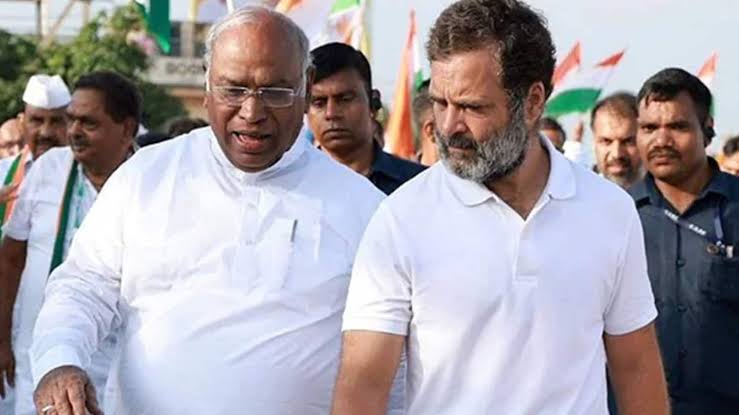
In Jammu Kashmir, one of the most debated political topics today is the visit of Rahul Gandhi to the region.
Congress president Malikarjun Kharge will land in Srinagar on Wednesday evening and will immediately begin a series of meetings.
Sources within the Congress Party told The Kashmiriyat that the duo will land in Srinagar today evening. “At Srinagar airport, the party leaders from Jammu Kashmir will welcome the duo and then a series of meetings will commence,” they said.
“They will arrive in Srinagar around 5 p.m. today. Tomorrow, they will meet district delegates at the Radisson Hotel, Rajbagh in Srinagar at 10:30 a.m., where a press conference will also be addressed and then fly to Jammu by 2 p.m,” sources said.
The duo will return to Delhi tomorrow evening.
The party will present the strongest candidates to the public and that is the primary motive of the meeting. “Also on the agenda is a series of meetings with other parties and may be an agenda can be reached within the Kashmir valley and in Jammu region,” the source said without naming any party.
Speculations have risen that the Indian National Congress and National Conference will announce an alliance for the assembly polls that start on September 18, 2024.
The Congress has called all its top leadership to Srinagar where Rahul Gandhi and Kharge will meet the top leaders from the party and discuss election strategies for strengthening the party at grassroots.
Omar Abdullah, the former chief minister of Jammu Kashmir and NC leader, during a press conference, recently said that the party may declare an alliance with the Indian National Congress.
Historically, the relationship between the Indian National Congress and the Jammu Kashmir National Conference has been marked by a series of significant events that have shaped the political landscape of the Jammu Kashmir since 1947.
Initially, the two parties shared a strong bond. After the partition, Sheikh Abdullah, the charismatic leader of the National Conference, was made the prime minister of Jammu Kashmir after Hari Singh accessed Kashmir to India.
Sheikh’s close relationship with Prime Minister Jawaharlal Nehru continued till 1953 when he was dismissed as the Prime Minister of Jammu Kashmir and subsequently arrested on charges of conspiracy against the Indian state.
This event marked the beginning of a prolonged period of distrust between the National Conference and the Congress which continued till mid 1970s.
In the aftermath of Abdullah’s arrest, Bakshi Ghulam Mohammad rose to power, with the support of the Congress-led central government. Bakshi’s tenure was marked by increased central control over Jammu and Kashmir, which further alienated the National Conference’s traditional base.
Sheikh Abdullah, having been released and reinstalled as the Chief Minister in 1975 under the Indira-Sheikh accord, contested the state elections independently and won a decisive victory in 1977.
In the 1980s, the Congress and the National Conference attempted to renew their alliance, however, the government fell afer Congress forged an alliance with Ghulam Mohammed Shah, the son in law or Sheikh Abdullah in 1984.
The Farooq Abdullah-Rajiv Gandhi accord of 1986 was a significant moment, aiming to stabilize the political situation in Jammu Kashmir, however, this alliance was short-lived, and differences soon emerged, leading to political instability in the region.
In recent years, the relationship has seen a revival of warmth, particularly with the personal rapport between Rahul Gandhi and Omar Abdullah.
This camaraderie was evident during the Bharat Jodo Yatra, where Omar Abdullah joined Rahul Gandhi, signaling a renewed understanding between the two parties in the face of the evolving political challenges in mainland India.
Earlier this year, the two contested elections in an alliance in Jammu region.




